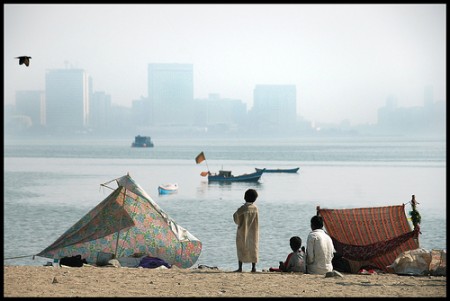
The workshop Inequality, Grievances and Civil War took place on the 11th and 12th of November 2011 and was hosted by the Center for Comparative and International Studies (CIS) of the ETH and the University of Zurich. Bringing together some of the leading researchers on group equalities and civil war, the aim of the workshop was to present new research on the role of inequality, geography, mobilization and institutions in explaining conflict onset and termination. Highly anticipated amongst participants, however, was the unveiling of the new GROWup(Geographic Research on War: Unified Platform) data portal.
Friday’s first session addressed ‘Horizontal Inequalities’ and was kicked off by Dr. Frances Stewart of the University of Oxford, presenting her paper “Horizontal inequalities at a global level: the case of Muslims versus the rest”. By placing horizontal inequalities as inequalities in economic and political resources between culturally defined groups, Stewart argued that global horizontal inequalities have similar implications to national ones. Stewart stressed that existing inequalities are a source of insecurity and can raise the risk of conflict globally. Hence, horizontal inequalities, whether they are cultural, political or economic, need to be addressed both on the national and the international level.
Next up was the presentation of Arnim Langer of the Katholieke University of Leuven, reflecting on the “Relationship between Objective and Subjective Horizontal Inequalities: Evidence from five African countries”. The resulting discrepancy between ‘objective’ inequalities and subjectively felt inequalities was traced back to a distortion of perceptions through people’s individual socioeconomic situation. Furthermore, Langer’s research exposed the existence of cross-dimensional contamination, meaning that perceived political horizontal inequalities significantly affected people’s perceptions of the prevailing socioeconomic horizontal inequalities.
Rounding up the program of the first session, Hanne Fjelde, a PhD student from Uppsala University, talked about “Economic Inequality and Inter-group Conflicts in Sub-Saharan Africa, 1990-2008”. Providing the first disaggregated study of economic inequality and the risk of non-state violence across a large number of countries, the paper finds that regions with strong economic inequalities and regions that are economically marginalized have a significantly higher risk of experiencing no-state-conflict.
Continuing after lunch, Lars-Erik Cederman (CIS) and his team introduced GROWup, the new online platform which facilitates large-scale data collection efforts and offers data dissemination tools to the scientific community and the public. The platform is based on cooperation between conflict researchers from all over Europe (ETH Zurich, University of Essex, Peace Research Institute Oslo, and University of Uppsala) and its creation was motivated by the Arab Spring. As the presentation stated, in order to better prepare researchers to confront crises in the future, the availability of data is crucial. The GROWup data portal thus unites a number of datasets on ethnic groups and intrastate conflict from various sources in a single relational database. Furthermore, it offers two portals to access the data: The GROWup Public Front-End visualizes a subset of the data. This includes, for example, an ethnic group’s settlement patterns, ethnic power relations and terrain data. The GROWup Research Front-End allows the downloading of customized datasets from the database in research-ready format on the basis of country-year or group-year observations.
The workshop continued with two more sessions on Friday and Saturday with further presentations surrounding the topics ‘Spatial models of grievances, segregation and Identities’ and ‘Mobilization and Grievances’. Research papers prepared for the workshop are currently available here.

